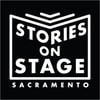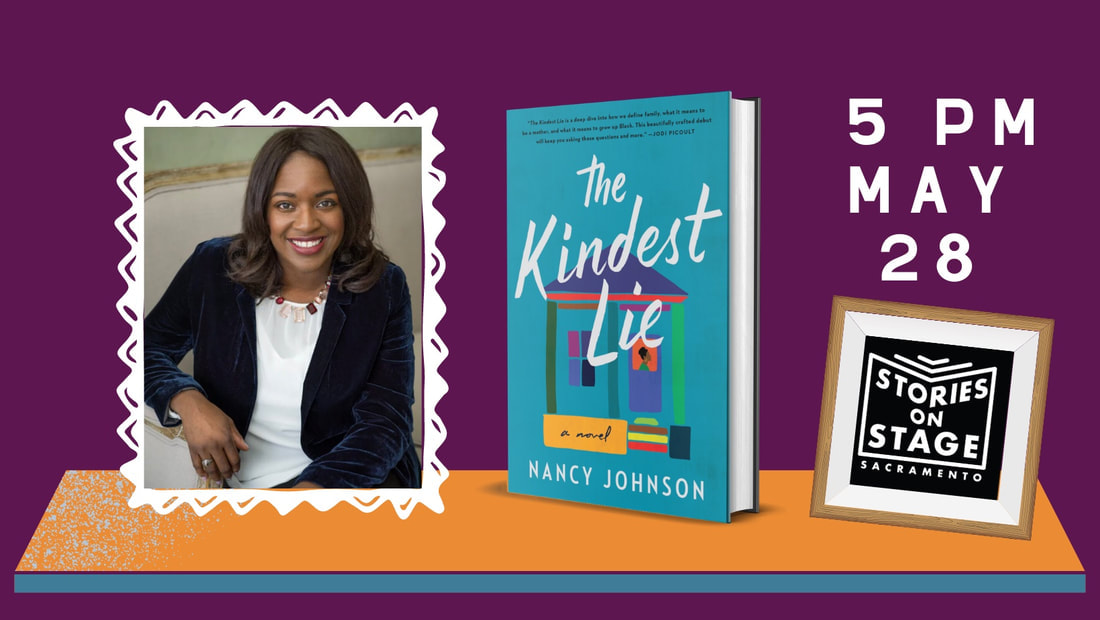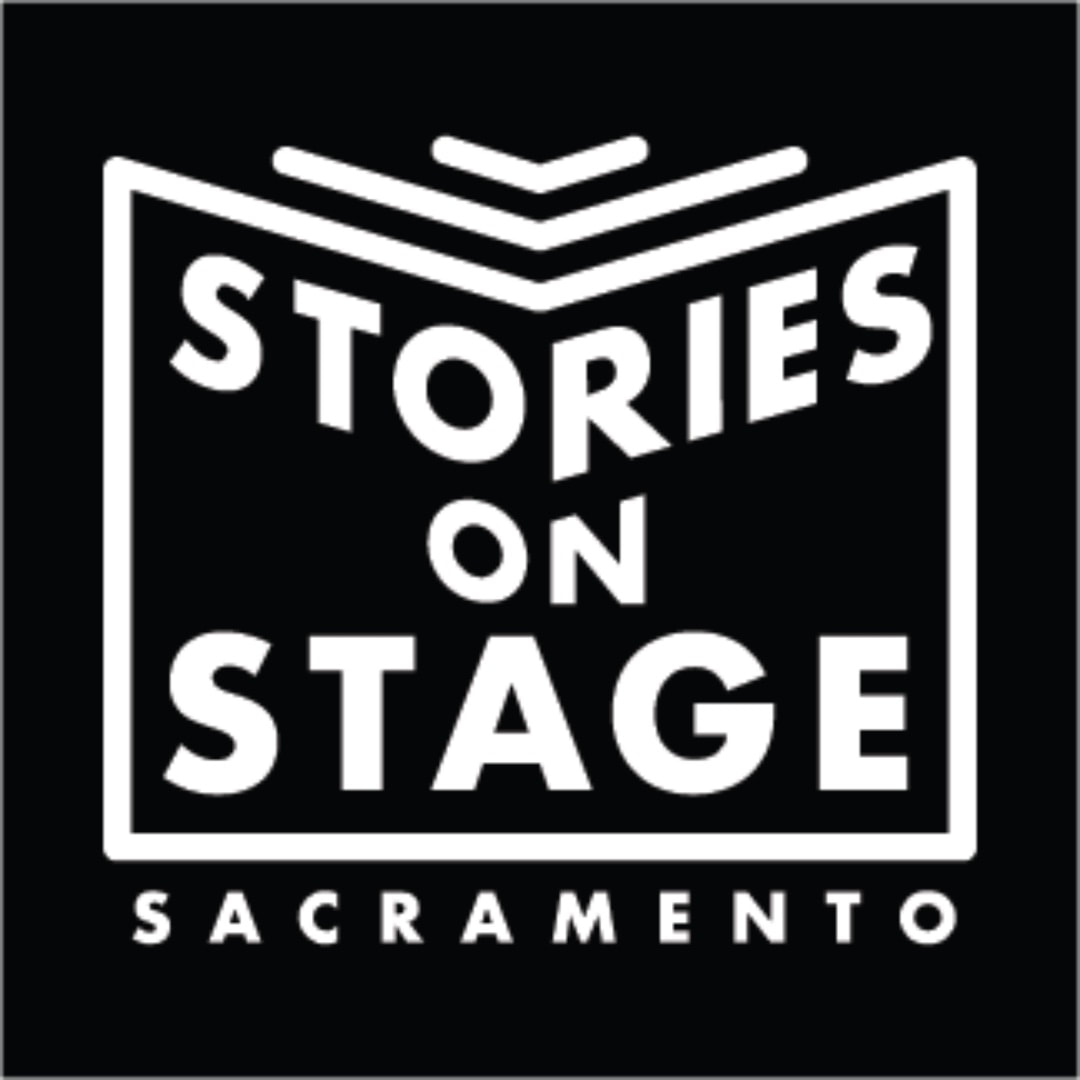 Meet May 28 Guest Author Nancy Johnson! This month, Stories on Stage Sacramento is thrilled to welcome Nancy Johnson, author of The Kindest Lie. Praised as “a beautifully crafted debut” by best-selling author Jodi Picoult, and as “a layered, complex exploration of race and class” by The Washington Post, The Kindest Lie explores “what it means to be a mother, what secrets we owe to those we love, and what it means to grow up Black.” In this post you'll several interviews and links. We hope you’ll enjoy learning a bit more about Nancy and what went into the making of her book. Join us Friday May 28, 5PM, live via Zoom (registration required) to meet the author and hear an excerpt from The Kindest Lie read by Sacramento actor Neketia Henry. INTERVIEWS Nancy Johnson | The fragile hope of 2008 BookPage interview by Alice Cary, February 2021 Nancy Johnson is an award-winning television journalist who makes her fiction debut with The Kindest Lie. Set against the backdrop of President Barack Obama’s 2008 election, it’s the story of Ruth, a Yale-educated Black chemical engineer who returns to her Indiana hometown, which is suffering from the economic recession, as she searches for the son she placed for adoption when she was 17. There she strikes up a friendship with Midnight, a white boy living in poverty and yearning for love after his mother’s death. Your acknowledgments refer to “the still waters and the turbulent tides of this journey to publication.” Describe that journey, as well as your initial inspiration for the book. In November 2008, my father was diagnosed with lung cancer, and I convinced him to vote early. So this man who survived the Great Depression, World War II and Jim Crow cast the last vote of his life for America’s first Black president. Even at the end of his life, he was lucid enough to know we had made history. He was hopeful for the future he was leaving to me. I still recall people saying we’d entered a post-racial era after electing Barack Obama as president, but I knew that was a fallacy when I saw how deep the racial divide had become. I was interested in writing a novel that explored the complicated issues of race and class at that time in our history. It took me 6 years to write The Kindest Lie as I juggled a demanding full-time job. Whenever a literary agent rejected the book, I often took it as a rejection of this important story I had to tell. Was it too bold? Was it too Black? Maybe. Maybe not. Sometimes I needed to revisit the story, deepen characterization and build tension. But as a writer, it’s personal. Our souls are on the page. Ultimately, my story found the right agent to champion it and the right home, with an editor who helped me bring it to life. For that, I’m immensely grateful. “I’m a great believer in creative freedom, but with that freedom comes an awesome responsibility—a responsibility to honor the truth of people who have a different background or life experience from your own.” How did your experience as a journalist inform your fiction writing? As journalists, we ask questions, we observe, and we bear witness to the human condition. That’s also my job description as a novelist. I was actually a local television news reporter for the ABC affiliate in West Palm Beach, Florida, during the Bush v. Gore election recount. So I know something about how an election night can change the course of history. In 2019, you wrote an article titled “What White Writers Should Know About Telling Black Stories.” Did you make an early decision to have both a Black and white narrator? We’re always debating who should write what and who has the right to tell which stories. I’m a great believer in creative freedom, but with that freedom comes an awesome responsibility—a responsibility to honor the truth of people who have a different background or life experience from your own; a responsibility to be intentional about avoiding harm. Which of your narrators came first, Ruth or Midnight? Ruth is a successful Black chemical engineer who left her baby behind to pursue her education and flee the factory town of her youth. She came to me first as a narrator and was most familiar to me as a Black professional often straddling worlds. The challenge was to make Ruth as complex as possible. For example, she clicks the car door locks in fear of her own people as she drives through her hometown. She doesn’t like what that says about her, but it’s real. I’ll let you in on a little secret. In an early version of the book, Midnight, the 11-year-old white boy Ruth befriends, was actually Black. However, I decided that tackling the racial divide worked better with him being white. I’ve never been white, but as a Black person in America who has had to navigate white spaces in school and on the job, I’m fairly fluent in whiteness. Nancy Johnson's The Kindest Lie Is a Layered, Complex Exploration of Race and Class | by Anissa Gray, Washington Post, February 3, 2021 The Kindest Lie opens as your characters celebrate the election of President Barack Obama. Although your novel is set in 2008, did you find yourself adjusting plot points or background details as you reacted to current events that occurred as you wrote—especially ongoing incidents of racial violence and discrimination? I began writing my novel at the start of Obama’s second term in office, and yes, several incidents of racial violence influenced the shape of the narrative. I don’t want to give away a key plot point here, but the climax scene of my book is a profound nod to a 2014 traumatic crime that stayed at the forefront of my consciousness. The Charleston, South Carolina, church shooting the following year informed a choice I made about how Ruth would handle the choice of forgiveness. Much of the novel hinges on two wonderfully portrayed women trying their best to hold their families together: Ruth’s grandmother, Mama, and Midnight’s grandmother, Lena, who are friends. Did you draw inspiration from matriarchs in your own family? Those are definitely two of the most powerful women in the book. They’re fiercely protective of the people they love, and they’re doing their best under tough circumstances. Mama Tuttle and Lena are compilations of many strong women I’ve known and read about. As an only child, I was a lot like Midnight, peeping around corners listening to old folks talk. I picked up on mannerisms and snatches of conversation, likely hearing a lot that wasn’t meant for my ears. I love how you address the intersection of class and race and its many complications throughout your book, especially the long history between Ruth’s and Midnight’s families. The story flows so seamlessly, but I imagine that you experienced hiccups along the way. Did any characters surprise you and suddenly not react or behave as you expected? Yes, the Tuttle and Boyd families have a long history together, the two patriarchs forging a bond on the plant floor. The two men shared a common love for hard work and family at a time when the auto plant was the beating heart of the town. But eventually they died, and so did the plant. The economic stress began to tear at both families, the realities of racism harder to ignore, and we see those bonds begin to fracture. Midnight surprised me with his intense love for Butch Boyd, his father—a bigot who neglected his own son. Once I saw that near hero worship, I began to realize that Butch could hold racist views and still dream big dreams for his kid. It took me some time to make peace with that because I didn’t want to excuse Butch’s behavior and portray him as a sympathetic character. What I learned though was that he was just as complex as everyone else, which made him even more interesting. Abandonment is a big element of the story. As Mama tells Ruth, “Sometimes leaving is the best way. The only way.” Do you agree with Mama? Was it a struggle to write the ending to a story with such complex issues? I believe you can put time and distance between yourself and a place or person, but you’ll always be tethered to your past. You can’t outrun it forever. Writing this book didn’t answer the big life questions; it just raised more. I rewrote the ending many times, trying to strike the right tone. The ending is hopeful with some ambiguity about where the characters go from here. I was never going for happily ever after. More than anything, I wanted the ending to feel inevitable and true. Have you started another project? Any thoughts on setting a second novel during another presidential election, either 2016 or 2020? I’m more than ready to watch your characters react to all of those events! In many ways, the Trump era was a toxic response to the Obama presidency. I could definitely see the Tuttle and Boyd families navigating a second economic collapse and continued racial violence while trying to protect the people they love. There are striking parallels between the world of my story in 2008 and America today. I’d love to see what’s next for these characters on the large or small screen someday. But for now, I’m in the early stages of drafting a new, very different book, which is always exciting. But rest assured that I’m sticking close to my roots, still exploring the issues that intrigue me: race, class and identity. "What White Writers Should Know About Telling Black Stories" Unboxed, by Nancy Johnson, June 4, 2019 WATCH NOW: BookPage editor Cat Acree live with Nancy Johnson, who takes us back to the year 2008 with The Kindest Lie. ALSO IN BOOKPAGE: starred review of The Kindest Lie. "The Kindest Lie: Chicago novelist Nancy Johnson talks class, redemption and race" Chicago Tribune, by Darcel Rockett, March 2 2021 "Nancy Johnson on exploring class, race, and motherhood in debut novel The Kindest Lie" Entertainment, by Alamin Yohannes
0 Comments
|
|
Who We AreLiterature. Live!
Stories on Stage Sacramento is an award-winning, nonprofit literary performance series featuring stories by local, national and international authors performed aloud by professional actors. Designated as Best of the City 2019 by Sactown Magazine and Best Virtual Music or Entertainment Experience of 2021 by Sacramento Magazine. |
|


 RSS Feed
RSS Feed
